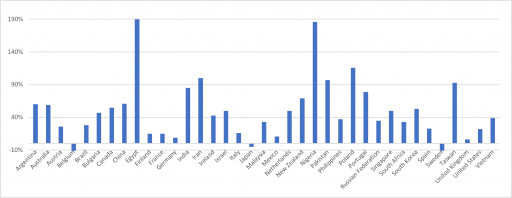AMSTERDAM, Oct. 14, 2021 (GLOBE NEWSWIRE) -- In ScamAdviser's 3rd Global State of Scams Report, 42 countries were analyzed on the number of people scammed and the amount of money lost.
Number of Scams Boomed
The number of reported scams increased from 139 million in 2019 to 266 million in 2020. The amount lost grew from €36 ($41.7) to €41 ($47.8) billion.
While the definitions and reporting methods used by different countries for scams differ strongly, nearly all nations have reported large increases in the number of reported scams.
The number of scams and money lost is probably only a small fraction of the actual size of online fraud as less than 3% up to 15% of consumers report a scam.
Investment scams are on the rise
The money lost per victim differs strongly by country as well as the type of scam. From less than €10 for fake shops, counterfeiters, and subscription traps to several €100,000 for ransomware, Business Email Compromise (BEC), and investment/crypto scams.
With the "zero-interest" economy and boredom, people, especially men, proved to be willing victims to "investment opportunities". These scams, also called 'pig butchering,' can run for 3, 6, or even 12 months. The scammer builds up a trusted and sometimes romantic relationship with the victim before inviting him to invest in an "incredible opportunity".
Countries are becoming creative
To fight scams, many countries have resorted to more aggressive annual awareness campaigns. However, results are mixed. As the themes of the scam change (e.g. pet scams, COVID grants), citizens worldwide still seem to fall for them, despite earlier warnings.
The Center for Cybersecurity Belgium (CCB) booked more success. It launched an email address to report phishing emails. In 2020, CCB received 3.2 million emails. The data is used to feed Internet filters, protecting Belgium citizens from malicious domains.
Likewise, Pakistan is training CyberScouts, which can be police officers but also students and youngsters. Goal: ingrain cybercrime awareness in local communities.
Finally, Japan launched Operation "Pretend to Be Fooled", asking people who've been contacted by a scammer to notify the police. The potential victim and police then work together to catch the criminal. The target victim receives a reward of 10,000 Yen (€77.50 / $88).
How to Turn the Tide
In many countries, scams are now the most reported form of crime. In Sweden, fraud was 5% of all crime cases reported in 2000. Now, it is 17% of all reported crimes. In the UK and USA, scams are now the most commonly experienced form of crime. Finally, Singapore states that 44% of all crimes are related to online scams.
The World Economic Forum estimates that 0.05% of all cybercrime is actually prosecuted. This makes scams, which are even more underreported than "big cybercrimes", a very lucrative business.
Online security firms are scaling up. Trend Micro, for example, is heavily investing in new anti-scam services, such as the real-time scam detection tool Trend Micro Check. In 2021, they already blocked more than 2.4 billion phishing emails and scam site visits.
While many developing countries are now focusing on building cybercrime awareness amongst their populations, several developing countries have learned that education alone is not enough.
Countries like Spain and the Netherlands have made online reporting via WhatsApp and Telegram easier, resulting in more and better data. The American Federal Trade Commission is gathering all scam-related data from 3,000 federal, state, and local law enforcers.
According to several countries, the next step is for tech giants to take more responsibility, using their own data to identify and prevent scams better.
While the USA, Canada and Australia have started sharing scam data amongst each other, most countries still don't. Yet, according to ScamAdviser, sharing online fraud data globally is the only real solution to turning the tide on the worldwide epidemic of scams.
The full report will be presented at the Global Online Scam Summit and can be downloaded from ScamAdviser.com.
########
Contact:
Jorij Abraham, General Manager
E: jorij.abraham@ecommercefoundation.org,
P: +31 6 52840039
Related Files
Long Article - 41 Billion Lost in Scams v211011.docx
The Global State of Scams Report - 2021.pdf
Related Images

Image 1: Growth in Number of Scams Reported per Country
This content was issued through the press release distribution service at Newswire.com.
Attachment
